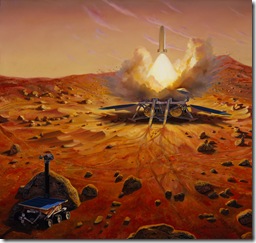 My project is progressing much slower than I anticipated. But I actually made some progress and slowly, very slowly the crunch part of the game is coming together.
My project is progressing much slower than I anticipated. But I actually made some progress and slowly, very slowly the crunch part of the game is coming together.
Astronauts will use a simple dice pool mechanic. For each task resolution the player rolls a number of six-sided dice. The number of dice rolled is determined by his character’s traits and possibly favorable conditions. If there are any factors hindering said action, dice of a different color are added (black or red for example). Each die that comes up with 5 or 6 is considered a success. Successes on the black dice negate regular successes. At least one regular success is needed for a partial success. Two successes are needed for a full success and so on.
Since I want to keep things simple, each character is basically made up by a list of traits and goals. Traits are either one word or a short sentence describing a character’s physical or mental abilities, or his or her skills. These traits basically describe a character with very broad strokes. But no character would be complete without goals. And that’s where it really gets interesting! All characters share a common mission goal (like establishing a base on Mars), but their personal and their nations’ goals may be quite different. One character may actually be secretly working against the others to further his own interests.
The goals are actually at the core of the trust mechanic in Astronauts. If you work millions of kilometers away from Earth, you need to trust your colleagues completely. Trust is a valuable asset in such a situation. In the game the team shares a pool of Trust dice that can be used to improve the chances in tricky situations. This common resource is affected by the level of trust within the team and when open conflict arises within the team the lack of trust may actually cause additional complications that hinder the success of the whole mission.
I am also considering using more structured gameplay than in my other games. Usually I am not that comfortable with the concept, but in Astronauts it might make sense. Each mission starts with the players defining a goal for the next mission. Then each player may pick a kind of scene he or she wants to play. There may be mission scenes where the players try to take the necessary steps to get closer to the mission goal, trust scenes where the players try to rebuild lost trust and personal scenes where the player tries to further his or her own interests. During each scene the character of the player who picked it should be in the spotlight and the other player characters may or may not participate in the scene. The GM may throw in complications like a broken CO2 filter or a meteor shower. Now that I think about it, these events may actually be a special kind of scenes the GM is allowed to pick.
What is making Astronauts much harder to design than a “normal” SF game is that a lot of the common SF and roleplaying game tropes are missing: there will probably no combat, no aliens, no faster-than-light space travel, no treasures for the players to amass. But I hope that the story-based approach, the trust mechanic and the scene structure may help to make Astronauts an enjoyable experience.

I believe that a great source of conflict in realistic games is some kind of conspiracy. Maybe there is a secret group with it’s own agenda, which may conflict with the players mission. The conspirator could be a third party, and the players would need to deal with them, or even worse, it could be one of them!
Think about the 24 series, but in Mars!